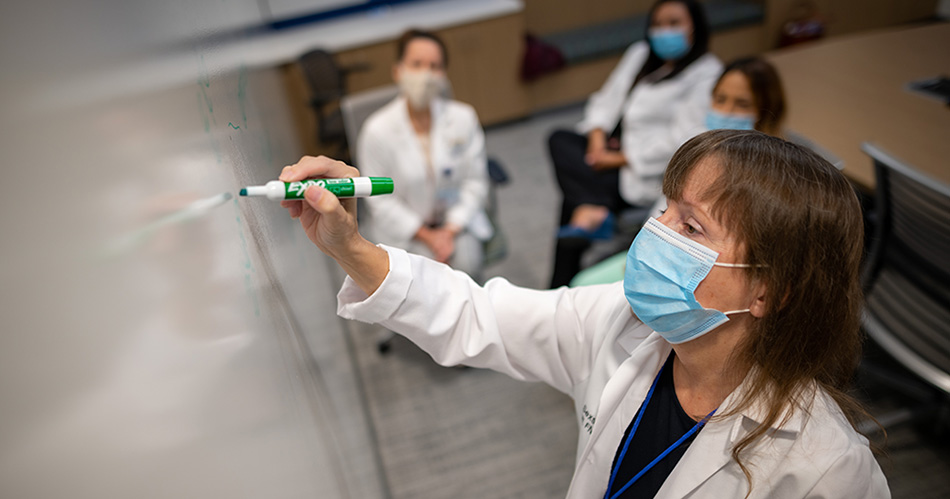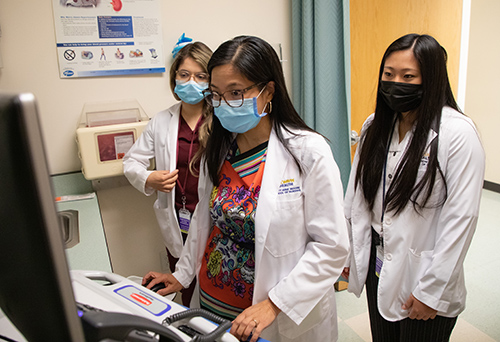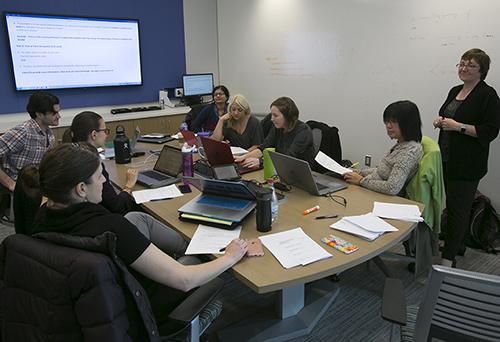Faculty diversity brings variety in perspectives, offers opportunity for students’ success

Kathryn Sexson, D.N.P.-F.N.P. program director, says an interprofessional faculty team partnered with instructional designers to develop and design the new program’s courses.
- A nurse researcher who works with African American church congregants to manage the challenges of end-of-life care
- A sociologist who studies population health and disparity issues among Latina and Latino caregivers and families
- A nurse practitioner who fights for the ‘have nots’ and serves populations with minimal resources
They are among the more than 55 faculty at the Betty Irene Moore School of Nursing at UC Davis who share a common commitment to achieve impact, as well as improve health and health care, whether through teaching, research or practice.
They are the educators who bring expertise in every facet of health care that benefit students in the Doctor of Nursing Practice — Family Nurse Practitioner Degree Program (D.N.P.-F.N.P.) and the Doctor of Philosophy Degree Program (Ph.D.).
“The old ‘It takes a village’ adage does not simply apply to raising children. That extends to how we prepare future health professionals,” said D.N.P.-F.N.P. Director Kathryn Sexson. “Rather than learning from all nurses whose lives revolve around classrooms and office hours, our team brings current clinical expertise, a tradition of nursing-science research and a desire to change the status quo in health care.”
Faculty immersed in practice

Clinician educators, like Chris de Belen-Wilson, provide care at community clinics while also precepting family nurse practitioner students.
Many School of Nursing faculty are immersed in practice where they face real-world issues such as treating COVID-19 patients, implementing new health care policy and embracing evolving diversity of the populations they serve.
These clinician educators are advanced practice providers, nurse practitioners and physician assistants, who work 80% of the time across a network of UC Davis Health and community-affiliated clinics. There, they care for patients and precept family nurse practitioner and physician assistant students in the School of Nursing. The other 20% of their time contributes to teaching clinical skills and simulation training.
These faculty are valuable preceptors outside the classroom and bring current, real-life experience and knowledge that enhances or supports instruction and mentorship inside the classroom.
Faculty lead research

Right, Janice Bell, associate dean for research, leads a Ph.D. research class. The school’s nursing science research program includes faculty from at least 10 disciplines.
The nursing science research program at the School of Nursing benefits from faculty from 10 disciplines. The diversity in expertise expands the scope of impact and increase the ability to transform and account for different perspectives.
“Nursing science is not just research about nurses and nursing. It is a holistic approach to health and health care research,” explained Janice Bell, School of Nursing associate dean for research and Ph.D. program director. “The problems that nursing science can solve are not the challenges of nurses alone. They belong to multiple disciplines, which are reflected in our faculty.”
Faculty develop programs and curriculum
As the School of Nursing is essentially a young school, welcoming its first classes in 2010, faculty are also part of developing programs and curriculum. Founding research faculty played in a major role in shaping the Ph.D. program. Current clinical faculty created what is the newest degree offering, the D.N.P.-F.N.P.
Since 2017, faculty have worked first, to map out goals and outcomes that align with accrediting bodies. Then, they partnered with instructional designers to develop and design each course to maximize student engagement, content synthetization and critical thinking needed for a doctorally prepared F.N.P. This collaboration allows faculty from all nursing and health care backgrounds to provide insight, leading to high-quality, engaging online coursework and content.
Leaders recognize that long-term success and sustainability require rigorous and effective research envisioned and implemented hand-in-hand with rigorous and effective education.
Ultimately, faculty’s role — as educators and lifelong learners — is to advance health in our community, improve the lives of the people we serve and prepare the students we teach for a constantly evolving health care landscape.
“The more diverse the viewpoints, the more work and commitment one has to have to keep an open mind, to be willing to sustain our desire to learn from others and to be inclusive of many perspectives,” explained Ester Carolina Apesoa-Varano, a tenured research professor.
“The biggest reward is when students see the holistic picture when serving our patients,” added Chris de Belen-Wilson, a clinician educator. “This means seeing beyond diagnosis and treatment and understanding the patient’s life context and how their situation can impact their health.”





